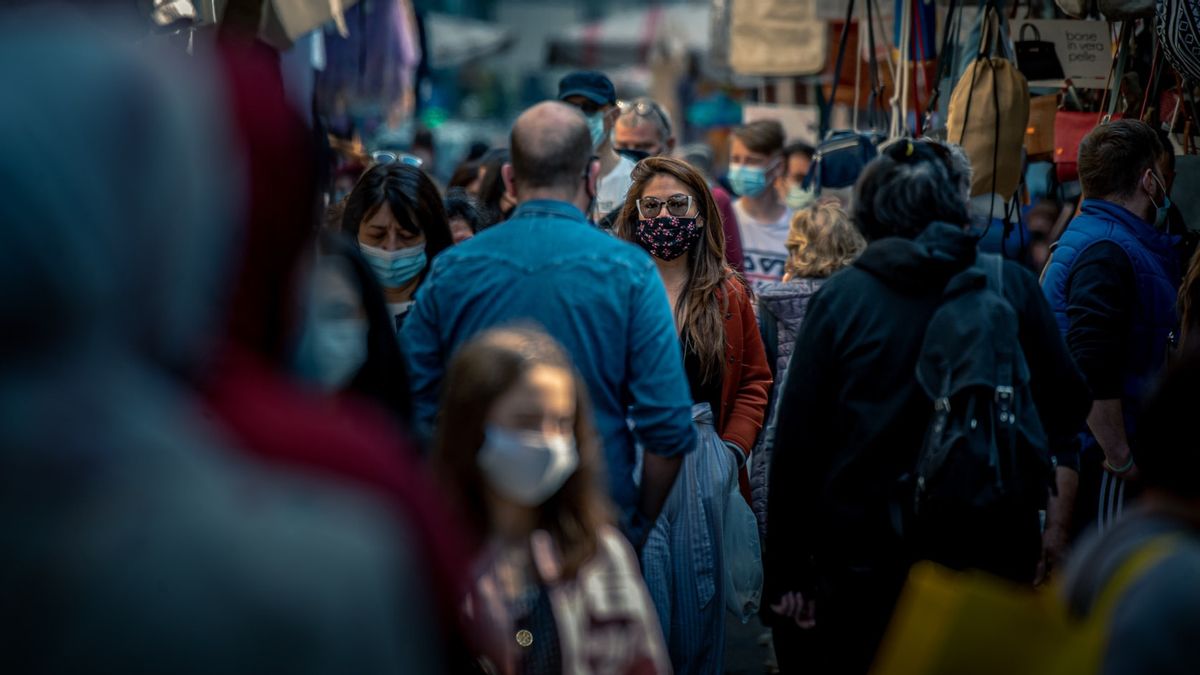JAKARTA - In recent days, molnupiravir has been widely discussed and predicted as a powerful new drug for COVID-19. However, is it true?
Professor of the Faculty of Pharmacy, Universitas Gadjah Mada (UGM), Prof. Zullies Ikawati explained that information about this drug had actually been circulating from March to April 2020.
This drug is said to have an effect of up to 100 percent during phase three clinical trials. then if it goes well, this drug is said to be available in the market within 4 to 5 months.
Patients can take their own medicine at home, and recover in 5 days, so it is very convenient to use just like treating the common cold like now.
"Very promising, isn't it? Well, at the beginning of October 2021, information about the drug surfaced again, after the pharmaceutical company Merck reported on its website the development of clinical trials of the drug, which said the results were quite promising," said Zullies in a statement Saturday, October 9.
What is Molnupiravir?
Molnupiravir is an antiviral drug originally developed by the Emory (University) Institute for Drug Discovery (EIDD) for drug discovery for the Venezuelan equine encephalitis virus.
"This drug compound is a nucleoside cytidine analogue, which can infiltrate the RNA chain and inhibit viral RNA synthesis through inhibition of the enzyme RdRp (RNA-dependent RNA Polymerase), which in turn inhibits viral replication," explained Zullies.
Phase 1 clinical trials were conducted in 2019 for the safety aspect. When there was a COVID-19 pandemic, this drug was tested for the SARS-CoV-2 virus, where the results showed in vitro and in vivo antiviral potential.
In further development, EIDD collaborated with two major pharmaceutical companies, "Ridgeback Biotherapeutics" in Germany and "Merck" in the United States to conduct phase 2 and 3 clinical trials on outpatients and inpatients in hospitals.
Molnupiravir was clinically tested on inpatients (test name MOVe-IN) and outpatients (MOVe-OUT). However, the MOVe-IN test has been discontinued due to poor results.
Then proceed to the MOVe-OUT test, which uses subjects with confirmed COVID-19 criteria with mild to moderate symptoms who are not hospitalized, aged 18 years and over.
Molnupiravir testing
According to Clinical Trial, in an official report on its website, it states that the MOVe-OUT trial began on October 19, 2020, and is expected to be completed on November 8, 2021.
The trial is planned to recruit 1,850 subjects, conducted at 170 research sites in several countries. However, the current clinical trial has stopped recruiting subjects after reaching approximately 1,550 subjects, which is more than 90 percent of the plan, as the results are considered to be quite good.
The efficacy criteria of this drug is its ability to reduce the risk of worsening COVID-19 and death, compared to placebo.
The data currently available are from an interim analysis, which evaluates data from 762 patients enrolled in the MOVe-OUT Phase 3 trial or before 5 August 2021.
The results of an interim analysis show that molnupiravir can reduce the risk of worsening of COVID-19 requiring hospitalization and/or death, in a 29-day follow-up period, by approximately 50 percent.
This figure was obtained from comparing the percentage of subjects experiencing worsening in the molnupiravir group which was 7.3 percent (28/385) with the placebo group which reached 14.1 percent (53/337).
There were no deaths in the molnupiravir group, while in the placebo group there were 8 deaths due to COVID-19.
Based on subgroup analysis, molnupiravir reduced the risk of hospitalization and/or death in all major subgroups, its efficacy was not affected by the timing of onset of symptoms or underlying risk factors.
In addition, based on the identification of the various viral variants that infect the subjects, there was 40 percent of the subjects indicated to be infected with the new variant viruses (Gamma, Delta, and Mu), so Merck claimed that molnupiravir showed consistent efficacy across all Gamma, Delta and Mu virus variants.
However, Zullies emphasized that there are no detailed reports regarding the type of adverse event, but reported that the incidence of adverse events was comparable in the molnupiravir and placebo groups (35 percent and 40 percent, respectively).
"Similarly, the incidence of drug-related adverse events was comparable (12 percent and 11 percent respectively). In fact, fewer subjects dropped out of clinical trials due to adverse events in the molnupiravir group (1.3 percent) compared to the placebo group ( 3.4 percent)," explained Zullies.
In Indonesia
Regarding the comparison with antivirals that have been used in Indonesia, Zullies explained that according to the latest COVID-19 therapy guidelines (July 2021), the antiviral drugs used in the treatment of COVID-19 are favipiravir or remdesivir.
"When compared, in fact their mechanism of action is very similar, namely working to inhibit the RNA-dependent RNA polymerase enzyme, so it can be expected that they have almost the same potential," said Zullies.
However, Zullies said remdesivir can only be given intravenously (through an IV) and in general it can only be given in hospitals by competent health workers.
Thus, remdesivir is targeted more at those with severe symptoms and/or unable to take oral medication. While molnupiravir and favipiravir, both can be taken orally (by mouth), and the target is COVID-19 patients with mild to moderate symptoms, who are not hospitalized.
The duration of use is the same, namely five days, twice a day. From the phase 3 clinical trial protocol, the dose used for molnupiravir was 800 mg every 12 hours. As for favipiravir, a loading dose of 1600 mg every 12 hours is required on the first day, followed by 600 mg every 12 hours on days 2 to 5.
Thus, if the results of this clinical trial can be accepted by the drug authority in America, the FDA, it is estimated that it can be an alternative to the favipiravir currently used in Indonesia.
"However, because there are no clinical trials that directly compare molnupiravir with favipiravir, it cannot be stated which is more patent of the two drugs," said Zullies.
Regarding the use in Indonesia, Zullies said that the government seems to have started to approach the drug manufacturers, but of course, it is necessary to wait for the procedures to be followed.
"Before being used in Indonesia, molnupiravir must obtain an Emergency Use Authorization (EUA) from BPOM which will be submitted by the pharmaceutical industry that bears it. Whether it has to be clinically tested also in Indonesia, it depends on BPOM's policy," explained Zullies.
If the data from other countries are acceptable, then there is no need to conduct clinical trials themselves in Indonesia. It would be very good if the pharmaceutical industry in Indonesia could then obtain a license to produce its own domestically.
However, the discovery and research of molnupiravir as a COVID-19 drug is very encouraging, and if it is really effective in curing illness caused by the coronavirus, this will clearly provide great hope and also to end this pandemic which has a tremendous impact in all fields.
*Read other information about COVID-19 MEDICINE or read other interesting articles from Ramdan Febrian Arifin.
Other NEWS
SEE ALSO:
The English, Chinese, Japanese, Arabic, and French versions are automatically generated by the AI. So there may still be inaccuracies in translating, please always see Indonesian as our main language. (system supported by DigitalSiber.id)














